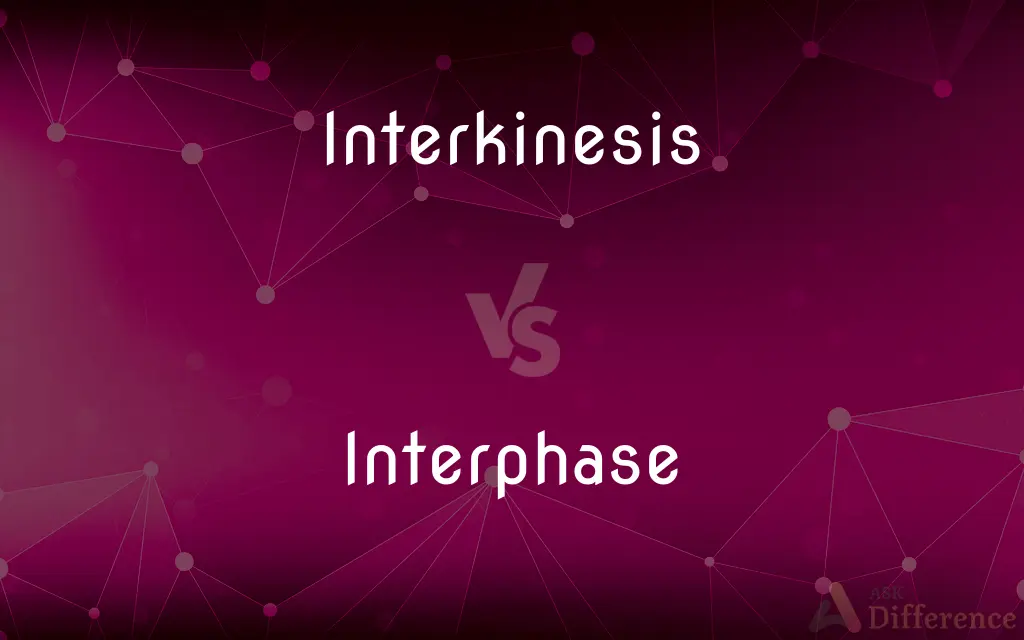Interkinesis vs. Interphase — What's the Difference?
By Tayyaba Rehman & Urooj Arif — Updated on April 9, 2024
Interkinesis is a short rest period in meiosis between meiotic divisions, lacking DNA replication, whereas interphase is the cell cycle's longest phase, involving growth and DNA replication.

Difference Between Interkinesis and Interphase
Table of Contents
ADVERTISEMENT
Key Differences
Interkinesis occurs in meiosis, serving as a brief pause between the two meiotic divisions, and it does not involve DNA replication. This stage allows the cell to prepare for the second division. On the other hand, interphase happens before mitosis and meiosis, characterized by significant cell growth, DNA replication, and preparation for cell division. It ensures the cell is ready for the complex process of dividing its genetic material.
During interkinesis, the chromosomes may decondense slightly, and the nuclear envelope may partially reform, providing a brief recovery period for cells. Whereas during interphase, the chromosomes are in a decondensed state, and the nuclear envelope is fully intact, facilitating RNA and protein synthesis essential for cell growth and function.
Interkinesis lacks any form of DNA synthesis, as the genetic material has already been duplicated during the previous S phase of interphase before the first meiotic division. In contrast, the S phase of interphase is dedicated to DNA replication, ensuring each daughter cell receives an identical set of chromosomes.
The duration of interkinesis can be variable but is generally much shorter than interphase, reflecting its role as a brief transitional stage. Interphase, however, occupies the majority of a cell's life cycle, providing ample time for cell growth, duplication of organelles, and preparation for division.
In the context of meiosis, interkinesis is critical for transitioning between the two meiotic divisions without further duplicating the genetic material. This contrasts with interphase, which prepares the cell for either mitosis or meiosis by duplicating its DNA and ensuring it has the necessary resources for division.
ADVERTISEMENT
Comparison Chart
Definition
A brief rest period between meiotic divisions
The longest phase of the cell cycle, involving cell growth and DNA replication
DNA Replication
Does not occur
Occurs in the S phase
Duration
Short, variable
Long, majority of the cell cycle
Chromosome State
May decondense slightly
Decondensed
Nuclear Envelope
May partially reform
Fully intact
Compare with Definitions
Interkinesis
Does not involve DNA replication.
Unlike interphase, interkinesis skips DNA replication, having divided chromosomes already.
Interphase
The cell cycle phase where the cell grows and duplicates DNA.
During interphase, the cell undergoes significant growth and prepares for division by replicating its DNA.
Interkinesis
A brief period of rest in meiosis between the first and second divisions.
During interkinesis, the cell briefly pauses to adjust its cellular components for the upcoming division.
Interphase
DNA is replicated during the S phase.
The S phase of interphase ensures each daughter cell will receive an identical set of chromosomes.
Interkinesis
A preparatory phase for the second meiotic division.
Interkinesis allows cells to prepare for meiosis II without replicating DNA.
Interphase
Chromosomes are in a decondensed state.
Interphase allows for active RNA and protein synthesis due to the decondensed state of chromosomes.
Interkinesis
May see partial reformation of the nuclear envelope.
The nuclear envelope starts to reassemble around chromosomes during interkinesis.
Interphase
Comprises G1, S, and G2 phases.
The cell progresses through the G1, S, and G2 phases during interphase, each with distinct functions.
Interkinesis
Characterized by a slight decondensation of chromosomes.
The chromosomes may slightly loosen during interkinesis, preparing for the second meiotic division.
Interphase
The nuclear envelope remains intact.
Throughout interphase, the nuclear envelope encloses the decondensed chromosomes, facilitating cellular processes.
Interkinesis
Interkinesis or interphase II is a period of rest that cells of some species enter during meiosis between meiosis I and meiosis II. No DNA replication occurs during interkinesis; however, replication does occur during the interphase I stage of meiosis (See meiosis I). During interkinesis, the single spindle of the first meiotic division disassembles and the microtubules reassemble into two new spindles for the second meiotic division.
Interphase
Interphase is the portion of the cell cycle that is not accompanied by gross changes under the microscope, and includes the G1, S and G2 phases. During interphase, the cell grows (G1), replicates its DNA (S) and prepares for mitosis (G2).
Interkinesis
The second stage of interphase
Interphase
The stage of a cell between two successive mitotic or meiotic divisions.
Interphase
(biology) The stage in the life cycle of a cell between two successive mitotic or meiotic divisions.
Interphase
(mechanical engineering) An indistinct region in the interface between two substances in composite materials.
Interphase
Between phases
Common Curiosities
Do chromosomes replicate during interkinesis?
No, chromosomes do not replicate during interkinesis; this occurs prior to meiosis during the S phase of interphase.
How long does interkinesis last?
The duration of interkinesis is brief and variable, serving as a short rest period between meiotic divisions.
Does the nuclear envelope reform during interkinesis?
The nuclear envelope may partially reform during interkinesis, unlike its fully intact state throughout interphase.
How do cells prepare for division during interphase?
During interphase, cells prepare for division by growing, replicating DNA, and ensuring all necessary components are present for division.
Can interphase occur before meiosis?
Yes, interphase occurs before both mitosis and meiosis, preparing the cell for division.
What is interkinesis?
Interkinesis is a short pause between the two divisions of meiosis, where the cell does not replicate DNA.
What happens to chromosomes during interphase?
During interphase, chromosomes are decondensed and replicated in preparation for cell division.
What is interphase?
Interphase is the longest phase of the cell cycle, involving cell growth, DNA replication, and preparation for cell division.
What are the main activities during interphase?
The main activities during interphase include cell growth, DNA replication, and preparation for cell division.
Is interkinesis part of mitosis?
No, interkinesis is specific to meiosis, occurring between the two meiotic divisions.
How does interkinesis facilitate meiosis?
Interkinesis allows the cell to adjust and prepare for the second meiotic division without duplicating the genetic material again.
What distinguishes interkinesis from interphase in terms of DNA replication?
Interkinesis does not involve DNA replication, while interphase includes a specific phase (S phase) for DNA replication.
What role does the nuclear envelope play during interphase and interkinesis?
During interphase, the nuclear envelope is intact, facilitating cellular processes, while it may partially reform during interkinesis as the cell prepares for the next meiotic division.
Are chromosomes decondensed during interkinesis?
Chromosomes may slightly decondense during interkinesis, but are fully decondensed during interphase.
Why is interphase important?
Interphase is crucial for cell growth, ensuring accurate DNA replication and preparation for successful cell division.
Share Your Discovery

Previous Comparison
Chickpea vs. Gram
Next Comparison
Unitarian vs. TrinityAuthor Spotlight
Written by
Tayyaba RehmanTayyaba Rehman is a distinguished writer, currently serving as a primary contributor to askdifference.com. As a researcher in semantics and etymology, Tayyaba's passion for the complexity of languages and their distinctions has found a perfect home on the platform. Tayyaba delves into the intricacies of language, distinguishing between commonly confused words and phrases, thereby providing clarity for readers worldwide.
Co-written by
Urooj ArifUrooj is a skilled content writer at Ask Difference, known for her exceptional ability to simplify complex topics into engaging and informative content. With a passion for research and a flair for clear, concise writing, she consistently delivers articles that resonate with our diverse audience.
















































